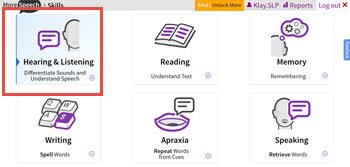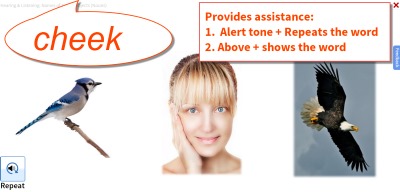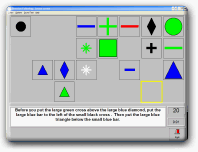Recovering Auditory Comprehension
Learn what Auditory Comprehension is, the level of impairment, and rehab activities to improve it.
As always, I highly recommend you see a speech therapist for a proper speech & language assessment. For those caregivers who do not have access to a speech therapist, you can get a very rough idea of how well the survivor understands what they hear.
It’s important to have a general idea of the survivors auditory comprehension, for two reasons:
- We need to know what level to work at with home practice.
- We need to adjust our own speech to what the survivor can comprehend. If comprehension is poor then we need to keep things very simple or write things down for them (if reading comprehension is better -see my reading comprehension article on that) . Conversely if it’s very good, then it can be an excellent way to compensate for other deficits. (E.g., if they have speech dificulty, but understand what you say, then you can ask yes/no questions: Are you hungry? Do you want a sandwich? Or a salad?)
Make sure they can do what you ask
Make certain that they are able to respond consistently in the way you ask them to. So, if you ask them a question and want to them to speak the answer (“how are you feeling?”) make sure their speech is intact. For this reason, it’s often best to have them respond in the simplest way possible, such as pointing to a picture. Ask “What do you want to eat?” and they point to the picture of the desired food.
Auditory Comprehension: understand what we hear
It can be impaired in several different ways:
- Hearing deficit: They can’t hear the the sound well.
They might have a basic hearing problem. If you think they can't hear well enough to understand speech, I suggest you get them a hearing exam from an Audiologist. - Difficulty processing or focusing on the sound.
- Difficulty understanding the language in the speech they hear.
Auditory Comprehension Levels
- Auditory Discrimination - Understanding Non language sounds (e.g., knowing when two sounds are the same or are different).
- Non-language sound Identification (recognizing that a sound is bell or tiger growling)
- Word discrimination (hearing differences between words)
Note: if the survivor has difficulty with level 1 or 2 then confirm that they can hear the sound OK. I'd suggest getting their Hearing Tested) - Word Comprehension
- Simple sentences
- Complex Sentences
- Complex instructions (requiring auditory memory)
Auditory Comprehension is harder to provide cues for, so we only have higher level worksheets for that. However, MoreSpeech.com (which I helped create) provides all levels of stimulation in the Hearing & Listening Skill area. You can create a free account and try it out.
Worksheets for Auditory Comprehension
Before you do the tasks below, you should probably explain to them what you are doing. Explain that you want to understand what they can and can’t do so that you can help them better.
- Picture Identification I
- Yes/No Questions , Level 1
- Direction Following: One step
- Direction Following: Two Step instructions
A caregiver or therapist will need to help the survivor with worksheets (reading the audio cues aloud for them). It's a fine place to start. But for the long term rehab ( about 9 hours per week, according to the research) , its often better to allow the survivor to work independently. Most survivors I've interacted with over 20+ years benefit from working independently. It gives them a sense of independence & accomplishment as well as allowing them to work as often and for as long as they like. Interactive software lets them work independently. It provides the sound they will be listening to as well as providing assistance (what a therapist would call intervention)
Interactive Software for Auditory Comprehension
MoreSpeech.com - Interactive web-based speech therapy
MoreSpeech has 18 Tasks for in Hearing & Listening (Auditory Comprehension.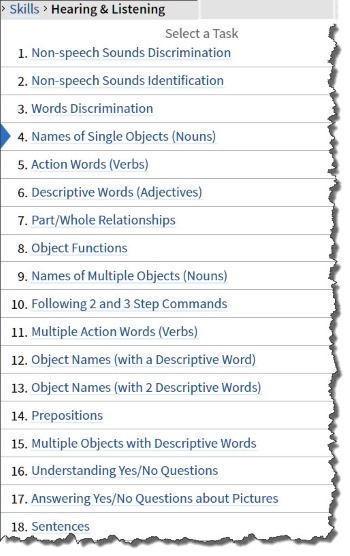 )
)
Example Task:
Auditory Comprehension software for the Windows PC
Understanding Questions +OutLoud
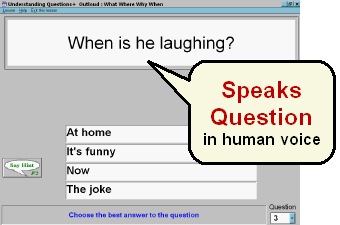
Listen & choose best answer
Listen to a question then choose an appropriate answer.
This can be more challenging than it seems as Who/What/When etc. are harder to comprehend than more concrete nouns and verbs ( apple, washing, etc.). Provides over 5,000 exercises with several levels of difficulty.
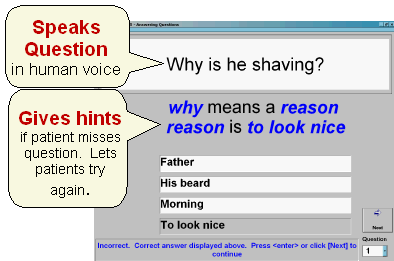
Hint#1 and #2
Provides hints (interventions) when the survivor gets the wrong answer.
Direction Following +OutLoud
The survivor listens to instructions and then follows them to select or move shapes on the screen. Provides over 500,000 exercises at over 200 levels of difficulty. Provides hints on incorrect answer :You are moving the circle, you should be moving the square.
A Perfect Challenge for Any Skill Level
Easiest: "Select the square" Most Difficult:
"Put the large red triangle above the small blue square, then put the mall green square above the large white circle, after you put the large green square to the left of the small blue triangle."
Video demo of Direction Following +Outloud
The above two PC programs are included in Bungalow Software's Monthly Silver Subscription. The first week is free and it include a coaching session to show you the best programs for your survivor, and the subscription can be applied to later purchase if you're rather purchase than subscribe.
Free Speech-Language Treatment Course
Every day is an opportunity for recovery. Don't miss a single day. I'll provide you the tools & knowledge for faster speech & language recovery
- How brain plasticity makes recovery possible even years later.
- Why just-work-harder is a recipe for failure
- The 4 types of Speech-Language Skills,
and how to assess which are affected. - Printable worksheets for home practice
Clay Nichols
Co-founder of MoreSpeech and Bungalow Software that both provide Speech & Language Software
 For 3 decades, Clay has helped patients, caregivers and speech pathologists with speech & language software. He shares the tips & tricks he's picked up along the way.
For 3 decades, Clay has helped patients, caregivers and speech pathologists with speech & language software. He shares the tips & tricks he's picked up along the way.
Clay is not a speech pathologist.
But he consults with the speech pathologists he works with (and has them review the blog articles). You should consult your speech therapist regarding any tips you read anywhere, including the Rehab Resources.
© 2025 Bungalow Software
